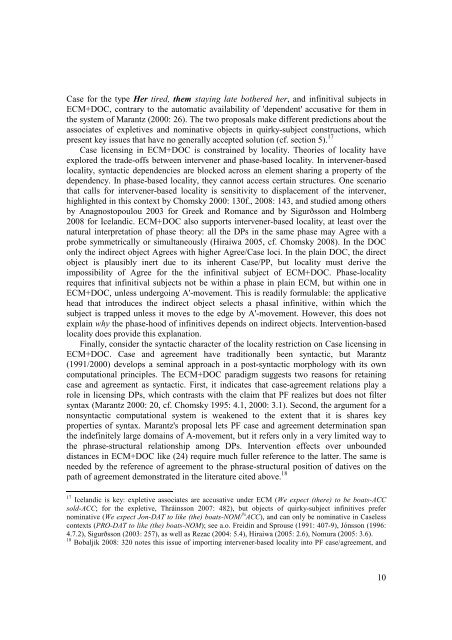Case Filter - UMR 7023 - CNRS
Case Filter - UMR 7023 - CNRS
Case Filter - UMR 7023 - CNRS
Create successful ePaper yourself
Turn your PDF publications into a flip-book with our unique Google optimized e-Paper software.
<strong>Case</strong> for the type Her tired, them staying late bothered her, and infinitival subjects in<br />
ECM+DOC, contrary to the automatic availability of 'dependent' accusative for them in<br />
the system of Marantz (2000: 26). The two proposals make different predictions about the<br />
associates of expletives and nominative objects in quirky-subject constructions, which<br />
present key issues that have no generally accepted solution (cf. section 5). 17<br />
<strong>Case</strong> licensing in ECM+DOC is constrained by locality. Theories of locality have<br />
explored the trade-offs between intervener and phase-based locality. In intervener-based<br />
locality, syntactic dependencies are blocked across an element sharing a property of the<br />
dependency. In phase-based locality, they cannot access certain structures. One scenario<br />
that calls for intervener-based locality is sensitivity to displacement of the intervener,<br />
highlighted in this context by Chomsky 2000: 130f., 2008: 143, and studied among others<br />
by Anagnostopoulou 2003 for Greek and Romance and by Sigurðsson and Holmberg<br />
2008 for Icelandic. ECM+DOC also supports intervener-based locality, at least over the<br />
natural interpretation of phase theory: all the DPs in the same phase may Agree with a<br />
probe symmetrically or simultaneously (Hiraiwa 2005, cf. Chomsky 2008). In the DOC<br />
only the indirect object Agrees with higher Agree/<strong>Case</strong> loci. In the plain DOC, the direct<br />
object is plausibly inert due to its inherent <strong>Case</strong>/PP, but locality must derive the<br />
impossibility of Agree for the the infinitival subject of ECM+DOC. Phase-locality<br />
requires that infinitival subjects not be within a phase in plain ECM, but within one in<br />
ECM+DOC, unless undergoing A'-movement. This is readily formulable: the applicative<br />
head that introduces the indirect object selects a phasal infinitive, within which the<br />
subject is trapped unless it moves to the edge by A'-movement. However, this does not<br />
explain why the phase-hood of infinitives depends on indirect objects. Intervention-based<br />
locality does provide this explanation.<br />
Finally, consider the syntactic character of the locality restriction on <strong>Case</strong> licensing in<br />
ECM+DOC. <strong>Case</strong> and agreement have traditionally been syntactic, but Marantz<br />
(1991/2000) develops a seminal approach in a post-syntactic morphology with its own<br />
computational principles. The ECM+DOC paradigm suggests two reasons for retaining<br />
case and agreement as syntactic. First, it indicates that case-agreement relations play a<br />
role in licensing DPs, which contrasts with the claim that PF realizes but does not filter<br />
syntax (Marantz 2000: 20, cf. Chomsky 1995: 4.1, 2000: 3.1). Second, the argument for a<br />
nonsyntactic computational system is weakened to the extent that it is shares key<br />
properties of syntax. Marantz's proposal lets PF case and agreement determination span<br />
the indefinitely large domains of A-movement, but it refers only in a very limited way to<br />
the phrase-structural relationship among DPs. Intervention effects over unbounded<br />
distances in ECM+DOC like (24) require much fuller reference to the latter. The same is<br />
needed by the reference of agreement to the phrase-structural position of datives on the<br />
path of agreement demonstrated in the literature cited above. 18<br />
17 Icelandic is key: expletive associates are accusative under ECM (We expect (there) to be boats-ACC<br />
sold-ACC; for the expletive, Thráinsson 2007: 482), but objects of quirky-subject infinitives prefer<br />
nominative (We expect Jon-DAT to like (the) boats-NOM/ % ACC), and can only be nominative in <strong>Case</strong>less<br />
contexts (PRO-DAT to like (the) boats-NOM); see a.o. Freidin and Sprouse (1991: 407-9), Jónsson (1996:<br />
4.7.2), Sigurðsson (2003: 257), as well as Rezac (2004: 5.4), Hiraiwa (2005: 2.6), Nomura (2005: 3.6).<br />
18 Bobaljik 2008: 320 notes this issue of importing intervener-based locality into PF case/agreement, and<br />
10

















